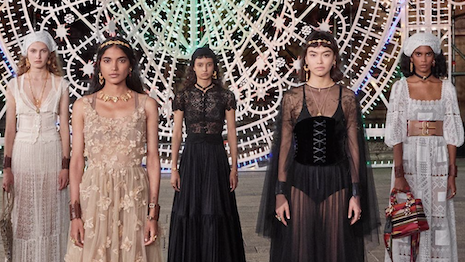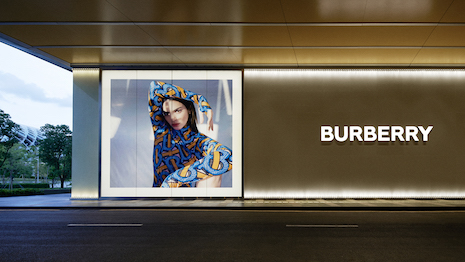Luxury brands have been challenged by lockdown-induced store closures and, worse, the post-pandemic “revenge spending” that is happening in China is not taking root in the West.
Marketers, therefore, must adopt a values-based communication strategy and shift their business strategy to focusing on the digital commerce experience in order to make up for the losses at retail, according to a new report from Forrester Research.
“Burberry is just one of the luxury brands that have seen marked declines in sales,” said Michelle Beeson, London-based analyst of digital and business strategy at Forrester, in her report. “As many consumers still face social distancing restrictions in their daily lives and working from home, there is less demand for luxury goods.
“Instead consumers have been forced online – precisely where luxury retailers have traditionally lagged in providing great experiences – and are focusing on only necessary spending,” she said.
 Dior's new 2021 cruise look is inspired by the southern Italian region of Puglia. Image credit: Dior
Dior's new 2021 cruise look is inspired by the southern Italian region of Puglia. Image credit: Dior
Regional differences
Global consumption patterns have differed in China compared to the West ever since the pandemic hit.
Thirty percent of French, 39 percent of Italian and 32 percent of U.K. online adults said that they were spending more online during the pandemic than they had previously, according to Forrester’s Analytics Consumer Technographics COVID-19 survey.
Consumer spending in the United States, United Kingdom, France, Italy and China has shifted to a focus on essentials such as groceries and cleaning products and many consumers are holding off on big-ticket purchases and categories such as apparel, per the Forrester report.
Italy has seen the biggest declines in sales, with 56 percent of online adults saying that they have cut back on their spending on clothes and 38 percent holding off on buying big-ticket items.
While LVMH and Kering both noted early recovery in the first quarter attributed to shoppers in the Asia-Pacific region, the West has not seen the same consumption patterns.
Sixty percent of Chinese online adults shifted their spending online during lockdown, as compared to those in the West. Sixty-four percent purchased more from online-only retailers during lockdown, as compared to 57 percent of Italian, 37 percent of U.K. and 30 percent of French online adults.
When it comes to future purchases, 48 percent of Chinese online adults said they would purchase more online in the future versus 24 percent of Italian and 16 percent of U.K. and French online adults.
“As Western markets begin to reopen, don’t expect consumers' behavior to follow the same patterns as in China,” Ms. Beeson wrote.
“For consumers in the West, economic anxiety will temper pent-up demand," she said. "Compared with metropolitan Chinese online adults, consumers in Western markets are less likely to allocate disposable income to luxury goods and will be more cautious as they anticipate the economic impact of the pandemic.”
 Michelle Beeson is an analyst for digital and business strategy at Forrester, London. Image credit: Forrester
Michelle Beeson is an analyst for digital and business strategy at Forrester, London. Image credit: Forrester
Digital acceleration
As luxury brands struggle to survive during this challenging year at retail, pivoting to a digital strategy could help brands make up for lost sales.
Online shopping picked up during the pandemic and has not slowed down since. Analysts expect this momentum to continue, and advise brands to be agile to thrive.
Fashion brands such as Yves Saint Laurent and Gucci, for example, have transformed their physical fashion shows into virtual events.
Not only does this approach allow the companies to keep moving forward during a pandemic, it also allows the brands to cut back on the massive carbon footprint of producing physical fashion shows and illustrate their commitment to being more sustainable.
Additionally, brands including Alexander McQueen, Chanel and Dior have used digital as a new way to entertain and engage with customers by livestreaming musical performances, hosting digital exhibitions and offering cooking and drawing classes to fans virtually.
Brands are also coming out of the crisis by focusing more on customer communications on value such as personal well-being versus product marketing, Forrester said in the report. This allows brands to build long-term loyalty even as consumers may be holding off on big-ticket items.
A focus on the customer is the way to build connections, so that when they are ready to spend, they will return to those brands that they feel most connected to, be it through purposed-based marketing or better digital experiences.
“To be customer obsessed, not just brand obsessed, luxury brands must evaluate the role of stores alongside digital touch points within a branded customer experience,” Ms. Beeson said.
“Brands like Kurt Geiger are upgrading their systems and processes to connect online and store operations with CX and thus create channel-agnostic brand experiences," she said. "This requires connecting systems for customer data, inventory and order management across the organization.”
{"ct":"e3npy72QF\/IH\/Z\/HHuoyZ8ILgSon\/L1hswLcfgz5ki3xPUhUOtx5igQ3FHK7Rmk\/g7F0edGzUXz9ycaiNVlJHc480+rOq6YD\/MHTZtwmPgdhstYLzBSyR\/0\/xJ2u8FneSPDrJ5jRCRbSP8QTh+7uMsYR2LvZoljVNTAWtJhwyFPBsYIxl1kK0pC2jbv9FDMjKLDSnigzoOqmmSTWYnKho9wHgI7PGlAt+xDU2+Zgjd9cA5fi1CC3hlt68G\/8CuYMagSZzEUmSpu2K5ZMLo5RTIh45SzOgOzQA7ltrj8x8guuQysl5449jawASnMw\/5kxKHrY+tPtWTdUhcntRY7qc9KELksX2tDft6\/Lcadm34woZQfFmxwUDD+nzyIIa3l9ynL0amb4de4Lme\/4j++Ft\/NiE7iFfG8fJeMSRHH7X6GaiiCfw4GCs60Jif+EfdqK4qMAAYhzFOvxJZ4I3vjmzQfsNdaYyQQSIbIXTcXzGrWdB6zVXPx5m6dMsmLcVCC6NEQ0D4Z6RTG4ZMWwuIjxLEhh44kxIpKV8v41KhAewGkk0z0pYRYJysxo8kCruTo\/y88grZzQWD8qfFjkogcwnLyCjf3UaTqXLTugIJL5fiGa7n\/9TBALggt701fvmJfUzoL2Lf71tYfkGvOmIPU1jtg9UVjleIb1LABlkVJpxUzFh+D58JGrnweqcQUlSgs7mtM1C1dNo7y30g+ADi13xZkVKnvw6fF37SQDwW22NNneAAoS0gHMDjd9opgVYt49hI9POn2uWyWSS5CqJfD+t2Iexd2a\/LhnmzY7VDpK1iDwseKCg1o+b60dmqNlpp5gnK2rG1fcX08KLeashNLJ41xsOmW3WmnFH\/Fi8\/cwLBE++ETFxOODIG72Zr3Uu31xMPv8ZlyU3dcGPBGa77x6GabzERCM9\/kPo1BLHTAq41r49ShrqUNFHn0ZWEyJ34+rpj6kKTb0DyVgRhyF0nzxErAr8Bv0uNS1+1yDUm4MLST6XzpqWSQp\/j2Nn+GyXK8p0hQ7jP7DB0HrYdOU6YOY04DDImFrZGhRZaIoS5+CbANOraHyp97FLm5thk0f8Sov0KjN\/2UELRGyEGmfX3GzKQUETfmj2FC00PK9nCFF0il3F3k3h6i8yLiVPXz9Gy52AHCmH+Jhkx9rKJDQWWPk7w9Kc0eFvEWDZ1C+5MgxJ8c2HUvJxowsaqfK2dzjFlYBxvasDyZCf+CHtxQ6VAvFGOPm4uMSW71pnTentTa0nHQzJQ5QE4iHHlyjhgJyczJ6k9vaweivgiBsK8oVz1iS8y9Z8f+p46hzCGxotLwklW80oh1chNA0lbhOc2egQXxXrdPuv9hNQkHCSjEz\/pU6\/Yh9fMDwtmijGWfw6gu35le2HzJJElzJpKm9qdILXL3BkVzG9vtq4pKGd9fTh9MJ4oWaAFK0JV1QraqX9Ytpz2\/YX6bL6v3y35iC2mFjLU4XVF3NMyf3ykcP4bUlCtDqMsYfG\/KD+8t53P5klkXAQ1O66mKy6AieD+PjD9fr\/ffeTOc4qYC8MYdwXPBe9aZ0Qof18JmMU812TRkFIHcCoslIfyVYHjGoEmrfcLJLsTMkM6r1YAtvNKVAnuw9xIpC14KQGh8CPLle7L1pqSCj4vQ8oihG5dmTxQePi2nc7VSiX8Ktu5V+nKJ1+KzJFP7n6wQjFT1M1RHeybhf5N2\/SXX1ETLgWZL8Wm2yp++S0J4ZfimJ1Bv49Fv7Ws3kjbWpWgTjaCmCNiPZrEkQUJdNoUz5IUn\/RjI0tLHBsPAwEY6kRYuql54FDlwSlajh+dBXA947Ptb74\/7DPGQwsQ+XBDZA7trffIT8e5egI7FukC96HFh3uwe3iuFnDW6nbfUm7hAVXk6lKwTk1KvPHs9QFVSbwvJLZGwtJY56aZT5akuQWAef+7M5NDDDVA5grGUYLiMUmSfF1wahnUvYWvGFbe1X22lonBbSsIBm3PFLbopBjfDW0uTvXNAwWZinbjSkoTPGLVB2sh4wYfORQ0Mxm842vQg1I6F2yreLHlXH7ZsbWtLU5dYJjxQeWahe2Z3moV8MpS2McBtF8OHZ3GYzHkZJfGTQ0AVsv0QhajcBODx6pr6Di3RRV+cAcE83x+xyhT7RCap1SmPn3pFOXiLTkPJp\/pYt7cuW6BO1y39sd68\/8c1nzpfIkEGslwrQWqg9JF4ombi6sFhbgssU0DVWpnC7R7UQr7ZEw972t0yhCT2FPy0F4tpwBLJq0I+qkdbHKtzr1cMT3B0sa10Ak1AKp6qpdD5pbgQDyC\/k8rbpGwrstCtNxKwobGKbgkdRd9+31Os0sCy+kqdr+cJaVrKT6V6K50gmv1qkzhGxS4Ra7uXUvJVcGfYHM94oM+iV13TqraxWaNw551M6zmWG3sjEIEzBNGacgxoNqJ72X\/37cbcsxSX0+2kAOpj3KPxbFdgGAtNbVNW+WP4tzCYg2XZ7rq9vzLc6Jy5sH5gswat3e1TqZVckw10osNDQ5ShP71uF2NwmUR8uLyaZkkjFQ8IqejWf0VUcgaVl0Aji0w4wdqn\/0oaqM14TcSG4SkGRfHU2JGfGQ2u8UgvVnWn1vwL1rniVx\/vEtM7cuoohO61AxPJG7rWqixrEC4Kj+FIF8o05yhrh9W+Vk+fmYOjRiDe6Zp\/k3OhcRN0SYyle3L6ZBxtoaQxJ+Pqg5tJPBYJg5UhbpGdXJu6+u07NPmRkoYTEBpFs5T5hToGaKSn\/RnIPHu6Ysir+qF8UrXqjZD6Ibi53sbFZSZ5zeLjQKMNlVf1Po580VWgKoDjif\/AqTYBzscx1PY4wB813mmSwXnOq6h\/Kk3W0TbXmRCYZfwuw7GA80L5yMmNYKoLnnrmyveF6NdDKhAjmdtFO8KEzrB0dk0GCeifYooCFf\/3\/LfTpoAsyU1DDN2LNQlObp7zRt\/aM9UpeNn9QqrcR6q3rhm9bBxGrLkJwf1FRStSA7YaxSAMdL5gLZjyxzbtbJUgHrMJjBBzOvyW+jdqU+PE4JizU\/uSUjEaTUbmLUlOinlUvEDaaF2goSX7IQODbDKvz6KJ4xZZV7BLiswPpJp75qD4x0eqDonyPA5VhDfF0RoNFxyouuUOWTx4fFSoQ7HsW2QmPc1YqteOkIMeAjxeiN1LJ6Y+1HUzx8GbfJEPa4N7JdwgHq0TDybl+cjTMoawBKHi4nCw7+s012GE6TRx9RECAgdnN6OHfyX6rbhzrCUbWRfMTPWdXQZy8lYwO6oClYuGRlscujgEglIaR3CXu3ljuf1iu6DS6Ph2L0OEqhC88aeQ1bHiW0ZsJPCabU\/PyE6XfSUAGUK9X0783+JgefUSpCtffNmxstaXbMwIbqOndqf0ldhzR6hPZmodLejXAQkMClLY7WkNCUW1g1riVYpW3WibxkIvvP5l6p742xmqMX3IjOP1ITciDX6zUjM38QsIs5tKRl3KSu18xgB5p\/K0TS1rlrLqC7xDOxDciYBYAXI2QMHqbVh6P0\/yD99f3Fv+kq\/y\/UKCIDodbtoSn49\/oEQ49UAPWfwsKuY8exArcFVnEBYyUelfYyLW4XB3ZebNTNhccAqjPdMytt9MqKpvCGZJVsUcrV9wIo1jib39eUpgfd0rYygCILJnnd5\/NzL8Y1u4nW3CYUCZfP\/TMFFy3l+OAmYnfQ\/QX3++ChQEvQtHKiVOdYh61JiFwUqARcu580RlfQCLueQ3hLqIkt\/JZeY+dRKGW7PCL+nYhLMqVaJvyXDKEaB+kSl14Ihv2Ai0iO0eKBefQUane+BAlM80H+hEX4YxiKSOkxM64ojprbzJayNL2bsJmpwXW7jsk3rOUzxCuwVNCPUUYfNV1ggeWu2uYS3TL8AVrgWgJ98ysf6yqI6J7GsAP54tA7TEdh5PR+53GPacEStTq4rHEH9KlloawugSNiL66C9z45pfAFxo\/TnKvT0kacDq+IPHZhQtTI3nJZ61H3jXIvtwZWSc4NE4RIsYLlorcCpIKYVBDKyCcGpeP0SDyXYRSV\/vmrQhg6RXTXNKT5L\/gk\/P+Pc\/+XDbgopWVSOHl95r0paYrmxyOEJCe3GiD0\/QoQJqDOerLZVrh94xPRZweTuIsZpouFfmXJdxYSaiwnXxXGgakb8ox3MC8tQSR0ADWLpndAYeXaNpmo4GEaxcdLpX7mBDF0DrivTnRSMxKr1p0bWnFYefaDPwXHO4M16m595xSDlfIEKKy2O1e1jFrTdnERWPAQy0dsPbMKxUSAPb6pKinCRS9PidszkOeuOicCPZVgzhd7FIyWIrQt2lFSm5argq2gJhyqDVvFuOa\/L1Gjtx30dK4oDxfIuyx7ooR+24UPTT8Wzu+s3skL1AWzMfPEHN2RcpI1gCtK\/LtTUe7kvpNrwMtIizvexOkfJj1i68v957Lt9ERzUDhaeb\/ANMmzsqrRPCSkMAryFQ56TKOQdC2xFDiaQpNGp5TIO2FKlSuajGoCjrrRr8CiJ0yhuWeaGsA5DiU42kQYaRun+Tfb3Ci6GI1IDNG1cue8BUTfBzpSFV2eIxp5Mqag6GBYOGvMqCTH\/BnDhoA1Wyx6aA31DnAAVyaPxRrLMlUgm+WBtp+6CnuL0p3A2nq0dFAf1rMfHKsb6mANfDgcdGFMVSyuRjZlqloEus9OnfjNUTXC7iuutobvWa0n2hxEo\/tsBYXb+9hsProyMvGuG\/xT7+7mFw4fzYRw34EOB4uoq+RpHoPyRFlIO8nxbOd0X0ZHF7vTLbGaDUJdgI00uOp8xzuHaaVsiNg9Qbe1AQowhclA23w8Gj\/rn82YY11fkxKniX05ey5GRku3LCW+ln4renvSXbmvMTNeEMQcxp1hhtqCIuUF0q6cI2Mm9MdGvLLiyWkkhxM45UvIMCg1iQ6ZKKien7BZ0PldC49EwEsBgpKbCHf2Bwj7hgqvanlWNisYHNOX\/eYmkYTiXk469NBWN1rIUzlewziUrEyjZh8wyi7tjso7kDTm2MYvCKvzwrM32GdeJ\/wAb1C5UUF5rUA4BUSfQBBeIWZu2Vl6XgvutDca6eyVwsC4wHza9l6SBR4Hj2z4b53tGK22kECkEgEBOStEi0AC92CRaP026DLJV70GND7YoyxMBw5+JWW+5ZjPBIjQVyrc9RN6vqL+71xhytYH4WN4+P1kDwhnPo4PSWKnUX4TbHnpKTd1AsqVoexsY2Fv5nAP1FjCa5nCxMs73xd+3MxYSoknK2vW1KOhlfhiNCGCmryN9T9YItB8qqJAvfUclEi7XckYJzRqCcuSmEKICCbXMQGYY69nC45YqDjJEBcfd1YOtnh\/n4ppvm2UzBlx5IGfAjXOyfHHaod1zXMTuFdG2+fgXDVSvmQkrv\/CV9DT+XPoMJdBCEyi0UilALPs1ANcLPrE4pXpfizL+B76pwe6YU08WZ67faC162XCCtI32wIlvKCRzQvuPPk6Gf+4jg7xLDjMu2iKumze7aqB8mdrH5yyGFNFtadNr1PFYSTyrdex8LXvcNpN7zPl5OrKqiLz26+N\/2IZGYd1ahC\/NBjKfg5GNdt1aZ8uDwRFNTy12Qg5poJbRMcH+cPtWcGZBXPaGwEhokGLyM84cQWf6hLCrt1TtyVDNRLpKlfZA82mZhEZVUdWS4PczoJIoC3Yuamq7gdcSTwv\/hR8SCViBI\/szdnY9+C6D+7J91EKv9MRc1JNiNH3ffRj4JpfS+HhbHxnrIkihS4f4ac9qY34bcYqSY5N5c4BWO6kHA20MgNCg2jt8nQspmAvaYY65ec0oJRKW\/ehvRufRIOhJ8sYi5S0PiFkhkJIweUyrzgzNMBBrdlhHzkZWDL+HyPSjvanpMFEaUnc7u0pP31ZO\/H4iYOeq0UJMAhTfxT2O7CqR3\/ykEdS\/9Ih0r9iKtby8SPT2gjGUB9mvOFedzwkAFQXYU067CK0TKaCfEsAouFMItZIIyp6ZWw9IOUU5GPkPdS42VDxMDftkgRzMSLqAOF960pgc7A\/FFjEzmy86tGBNL7l8NmYlCcRhBwir6krupezAeqh\/pJSRKDIVI3PKralZUUg0dgbklfaWgOi1kgZDYoCUD\/2hH8FYsDazlN3knir244pZ6Fd9pN4KCdYYYytIwiAnJ\/OCrJ2WtZSWJZiwG+Oq7rFdbIrJlLBwgFVR7m6uR1NJmDN8WWIu1PgdhV0UY49BysuCIoeyawHZdv1qyhOsiRIUdGdVIs\/Jd4atMG3bX7BVtwfeAlCrIOV7gjmlGXP+XguabHRGWcMipeRLdtb4SN3kKz1X7kuiaR54XpkCxLhfgY+FLT\/T35FGGYdn61Dppl2BT03p2AU3nTPpg69oKZdEAr9Hk0KnIF9AAUuSYfDdSPC\/6XHgJdOw3J\/G7Qpq\/FKCueDK+l3FLFUY4JdOOZjrqL3MalJHk\/h\/MuskE+rsOZZQh1v71VFIlGoFOzaZ2L1eMXJIckM4gDcPgC95NbyxSfQSdfZnrgb9gaAQO\/3H8s5twBg67tFDNTq\/ay87N3Cr1SXKDGJdKVrKABhfswW4Ix7JG9wKMQzDvdB\/PwcmOc4UTbWMhiy\/SPmHozMPdbzRGQBvzR+To1WaCw9ETfnjMURrWtMXeVI9ovwPzVzJksiBt8aLeBE+Tz2VBiJHZFF3HDHqbq4BgDqEg+JUeFotES5EuXR5bOqhQD8fZBZTLiVd6ZUsR9QxBm8mZgEx4nZtcycn2r1y6\/kVyhumJw+tBvLcNacODoLmm+ON8CmqrpZqP6P5B0ZtYIoYCKHwEv1TFqZvXduAAzJjiyV+ZHgKpNpQbc5Mt86Hxail3GSVqPNAPc4q0B\/rKRj69ab1lYXHzvkjAWF7s4WkRcmIY8s1+vOTyRJTh7mc9vru70833hPtMiRFbHBjrLYcBMmhekJ\/BtwkQ7CCmaseJSMgzKqT2+lUFvfp2W+BHK5o2o9uLgcoCHFZxqyRqPXWsHpAILDvnxZ\/mmeykMydc8wb0IigGAI9SvxCB\/kT+r4XtDWsLdg0Fd09BMYg5Z0YKIYd\/LghG49gl9+qlkb1ea8xA053B0mz0U5Q1SZSEeWjRLwdXgg0ZwGsyaBGKQjUOd094kXHLEk6G47\/szmQjafq+y3LWsoXrs4fpYNCDD+I7qEx1TZdSpv1f8JK333euNR8IQtws1EwF\/\/6G0usW3CRg4bX1MhqWKy9PLrDuF+3infYsL+olkTsI7XcBbyPF7GOAIYDco9nF7Cf0jBN5D+JkSyNDVtBpHi34boVDz2wL+h6WIoMUyHGUX3LPSoFeINdIIkiLeTCYthLiuPzj\/g+iT8+1Xr3jPghAVb+GN9joDwjLE9GoQAlehHVvHVqOXEnP44Yg9j\/TF52oK0R6lASEcZogPPqQFcTXkjaoJ+g7yCfItd4hTriAnMg2kbCAj6pwzaC6i00tJ2XSxacVXHRoEwEcIu7kBjOAZrmNInDncMJHakXN3fL2R9L\/gNaCvyQPhjmMTilYZFPM8XZYSMvlZ1vjD\/pddy7dFPcfx4u8tNTT2AnSnPJ1+XT8qwLz0SCs9YvXjOFtXVP8u51NzDGMvO8hsgQnmYE96zUkOJ3q4lc6beUkek5kzhR3RyjTzUUDFucG0AOoqY6mAoF9AYxfTxOPyFxXiplhH4oGXEDOp7pc\/\/d825DFGpe9nNKxw7apAsJRi1UAsgjdQkZAUsAODULNyXEfpzKIH6f2CJ1uyyj1wUH2ZfrNi6Sm7h\/wLpld39UDLopXjaFHgR+Q9a+EUI2XmiciNALm1SuSj6i+To0Z0re72+rfgEIYXEnOGP9nWsvyVjl\/6RooMxX6klOA6Uno4JqDHXoz2cBUVgL5Ns9OVnsfrC4z24kzkMC5fFm5OpsDkMb8kh4pVA17pK+QNELUYkBthaazDudfW5qOM8EQpquuo3wTbTMymPv7AYE8F2acHxUwYoY91vo0azi0UARG39HG6kxJzoOOj8rS9TGjXZfpEAB6fTap3bVIbNeuiTTp4STfl+kxl\/ZQjLUgcq89S70wDtyuKBOAT0Bkl47vvswvV7hCDZGyDO5z7Bm6YK38VSE7Isc7fgDbokp8es9jOpzTR6gRDqdWaQnja3jraKdUqtZZvli39\/gs34ZfL\/oV7gcgBXSeyQ38vgVx7+SvQP5tw\/AKUUvw8m2cnO4\/1moGYwtaXAjlqDIHzKjEPLnpH3aksk5DSPj31L5qCdtyCr6\/ohcnjxJiuQEUDlPwTBzMV+jO9HkqP31Y6af5JA5vnNHDWKKqwzJsdPErVCYu92awWBYk+Clr\/ojTLMV34bkyz\/mtLbMSLqa\/Izf5v8r9Nql4BzHPERGIsifpWg36ge1xtUOlGe4JVik1wA8W7cN3XZWIGfnzgQPLidA4zUqDW5BLLL7OIy\/ytnsumjHQqIIoQv4D1onKfKD7E+\/rZo04HdyCGifxKQAy2d2rPCdHtcBXmwlhGcM6ovz9IQg0rD5z1YKEqUUbFNiT\/m9zdI2U\/FsqVH7mWxeXHEBXg8MFKrZoY\/8D+aPNTkDoum75KxTryScLXCGZnxf5sAmOaILVOh8pohrJsb8ODDgawZUreCGHqmgk\/GP9JuV9cvhNH9rASwakFVt0ia0blpVWdERihgbA2HYRLxy09vnTiyd88mLc00dDdNpQdIO\/A5a+7","iv":"f8fa76ef13eb15fa8df1e95e6fc8859d","s":"c396a38ab5558c1a"}

 Burberry claims its shop in the Chinese tech hub of Shenzhen is the luxury world's first social retail store. Image courtesy of Burberry
Burberry claims its shop in the Chinese tech hub of Shenzhen is the luxury world's first social retail store. Image courtesy of Burberry
 Dior's new 2021 cruise look is inspired by the southern Italian region of Puglia. Image credit: Dior
Dior's new 2021 cruise look is inspired by the southern Italian region of Puglia. Image credit: Dior Michelle Beeson is an analyst for digital and business strategy at Forrester, London. Image credit: Forrester
Michelle Beeson is an analyst for digital and business strategy at Forrester, London. Image credit: Forrester